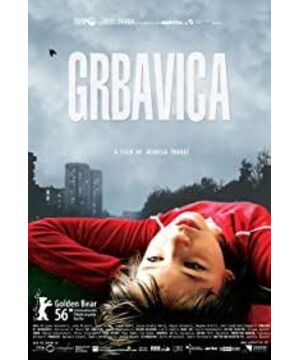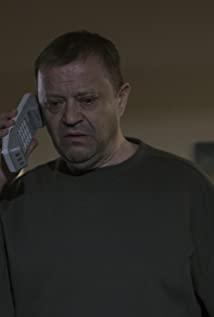There are many films about the trauma of war, and there are many expressing the pain after the war, and this one is from the 31-year-old female director Yasmila Zbanik The Bosnian film of the hand is full of aura and shocking charm. It has reached a certain degree of spiritual connotation, and quietly brewed intermittent and continuous hopes in the context of sustenance.
This film selects the civilian perspective, and expresses the details of the lives of a mother and daughter who are currently dependent on each other, the conflicts and sorrows they face, to reflect the aftermath of the war in Bosnia and Herzegovina more than ten years ago, and to mention some points. Those who have experienced it must actively face the practical meaning of life with the help of the power of love and affection.
Although the protagonist in the film is also a pair of mother and daughter, it is not similar to "The Two Mothers and Daughters" starring Sophia Roland, and the film is a non-flame-free and indirect way of expression, creating gun smoke and violence. True sadness. The character’s life is located in the outskirts of the famous Sarajevo. The Serbian army built a prisoner-of-war camp here in the early 1990s. The title of the film directly leads the audience’s thoughts to that heavy history, and the film’s authenticity Roughly from the director’s own witness, her address was very close to Gebavica at the time, and she saw the bloody Gebavica who was once full of slaughter and rape.
The scenes of the film are mostly clear winter snow scenes, either piled with snow, or snow fluttering, which fits the artistic conception of calm looking back and facing calmly. At the same time, the film’s atmosphere is calm and steady, the structure is clear and clear, the narrative is sincere and delicate, especially the manipulation of the characters’ inner trauma, full of reappearance of life experience and touching talents. It can be said that the film has strong and profound accumulation and thinking. When watching the movie, it’s hard to believe that it came from a thin, quiet and elegant young woman, and this is only her first feature film (previously directed by a documentary). At that time, the film brought fruitful results as soon as it came out. The 2006 Berlin Film Festival Golden Bear Award for Best Picture, Humanitarian Award and Peace Award.
Soon from the beginning, the film explained the situation of the mother and daughter in a simple and orderly manner, and laid a factor in the details to analyze the character: the withdrawn and rebellious 12-year-old girl Sara grew up in a single parent environment in the absence of her father. Like other classmates, she proudly declared that her father was a martyr; her mother, Esma, went to a nightclub to work as a waiter for her daughter’s school outing for 200 Euros; Esma only received social subsidies. She went to the "Women's Center" to listen to the psychological counseling class, and she never talked about herself. The female person in charge of the center pointed out that people who never speak often have deeper pain and have never been released and relieved. Indeed, Esma, who is silent and has a faint expression, has had an experience that is so painful that it is not easy to load.
As a woman, even if she is forced to become pregnant, she will give her true affection for the child. This is due to motherhood, but the real nightmare once invades her mother's mood from time to time-she was imprisoned in a prisoner-of-war camp during wartime and brutally suffered by Serb soldiers The gang violent Esma was pregnant and gave birth to Sara. Esma fell in love with her the moment she was holding the baby, "She is so small and so beautiful, so I forget what is more beautiful in this world. "New Life allowed Esma, who had never wanted this child, to accept the dislocation of fate and its filthy origins, but she was still imprisoned by her own heart, who had never been released from the pain.
The film uses some details to show the volatility of Esma’s emotions. For example, when the mother and daughter play with pillows, the daughter straddles her mother’s body, which stimulates Esma’s memory, and she suddenly pushes her daughter away coldly. ; Another example, Esma, who received a social subsidy of 80 yuan, went to buy fish, and happily said to the fish seller, "Sarah loves trout." At dinner, she put the whole fried fish in her daughter’s meal. In the plate, a sentence from her daughter suddenly touched her nerves. She sternly told her daughter to put down the dishes and cut her nails. Another example is that Esma would be dizzy and nauseated when she saw the customers in the club putting their hands on the escort girl. Medicine can continue to work; for example, the nightclub bodyguard who has a good impression of Esma fought to save her, but Esma shuddered at the sudden violence in front of her, and could not help but yelled abruptly: "You are all beasts. ".
As the largest local war in Europe after World War II, the War in Bosnia and Herzegovina cast a huge shadow in the hearts of the people in the region. In the film, you can see the damage and devastation left by the war, abandoned buildings, and still bleak neighborhoods. Elderly people who are still living in wartime due to excessive fright, a large number of children who lack the love of their fathers, women who seek social assistance, and their lives are stretched. More problems come from the hurt and pain of the heart. Esma, who was deeply traumatized, had psychological barriers in contact with men. The reason why she was able to talk to her bodyguards was because they met when they were looking for relatives in the dead piles of the concentration camps dug out. The experience made them talk about it. When the bodyguard was about to go to another country, Esma finally said: "If you go, who will claim your father?"
Mier Jenna Karinovic , who plays Esma, has a great performance and is very good. It interprets this Bosnian woman who has gone through hardships but still needs to live bravely. She fully reproduces the deep feeling of pain. Therefore, the character is often disturbed by the unbearable past and her emotions change. She also performed that. This kind of perseverance, working hard to reconnect the fragmented and devastated life, even after experiencing the difficult path of hatred, disgust, despair, and patience, she also gave the character's deep love for her daughter with blood and tears. When her daughter asked her if she would When she remarried and lost her, Esma hugged her tightly, and said excitedly: "Never and never." And this line is to combine with Esma's feelings when she embraced her daughter for the first time. This kind of painful love is sorrowful.
The heartwarming place in the film is also the true feelings between the rest of the life. In desperation, Esma borrowed money from Sabina, and Sabina, who was also poor, asked for help from the workers. Although the female workers were not well-off, they still borrowed money. The money comes, and the 200 euros collected from a large amount of change are saturated with human warmth and comfort. The excursion expenses were collected, but it set off a storm of truth. Before the storm, the mother and daughter were always stumbling, and the contradiction was gradually intensified with the privilege of "Martyrs' children can get free school trips". The daughter urged her mother to take it out. The martyrs proved that the mother repeatedly pushed back. When the fee was handed over, Sara who was questioned by her classmates broke out. She raised her gun at her mother like a desperate beast, questioning the truth. Finally, Esma also broke out...
This storm was the introduction to Esma's release, and she finally cried out her experience in the psychological counseling class. Sarah personally cut off her hair because that was the similarity her mother said when she was eager to know if she was like her father. The outing trip finally took place. Sarah bald got into the car speechlessly, looked at her mother in the back seat, and watched her daughter go away. The mother wept with emotion.
At this time, the beautiful and affectionate song "Sarajevo mon amour (Sarajevo mon amour)" sounded, Sarah sang along, and gradually smiled. Then the character singing was replaced with a soundtrack sung by the singer. The gurgling Qingyue tunes and beautiful melody combined the love for the homeland and the blessings for the future. It hits at the end of the film and permeates for a long time, as if a kind of spiritual comfort and frankness. The necessity to protect peace.
(I can't find the original soundtrack of the film. This is the lyrics of the catchy "Sarajevo mon amour" at the end:)
We grew up together, my city and me.
The same blue sky, dedicated to us a poem.
At the foot of Trebević Mountain, we have the same dream.
Who will grow faster, who will grow more beautiful.
You were so tall when I was born.
On Eagleman Mountain, you smiled and coaxed me to sleep.
This grown-up boy has fallen in love with you.
Stay here, with his city.
No matter where I go, I always dream of you.
All the roads take me back to you.
I look forward to seeing your sunshine,
Sarajevo, my love.
You have your song, I sing for you.
I hope to share my love with you,
as well as my joy and happiness.
Sarajevo, my love.
http://nicolew.blog.hexun.com/32743151_h.html
View more about Grbavica: The Land of My Dreams reviews









